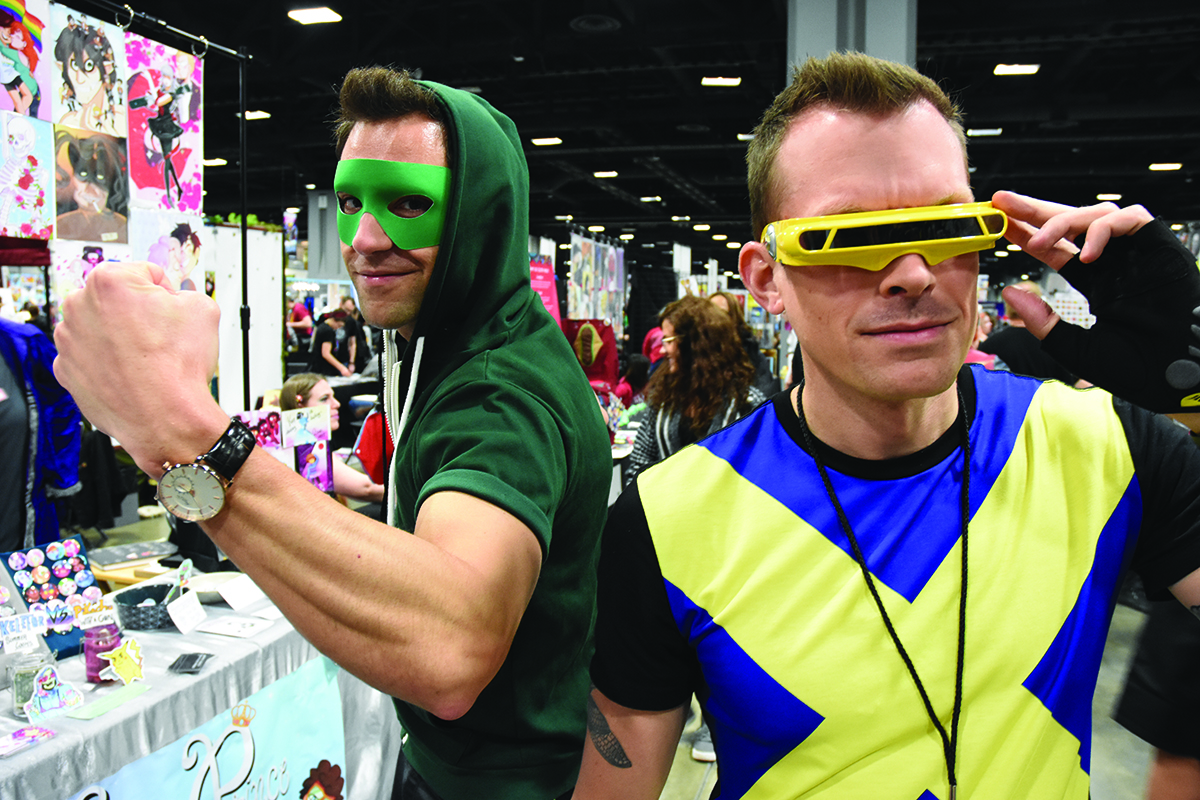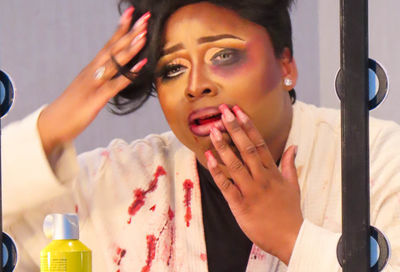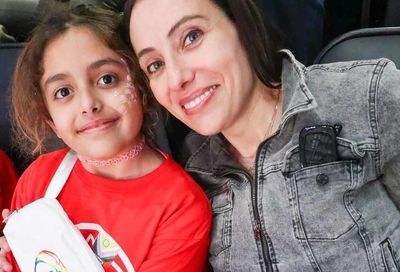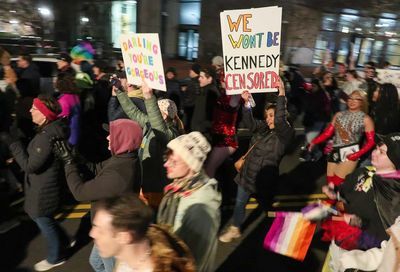Under Sexed
LGBTQ students must often look elsewhere to find information lacking from traditional sex ed classes

“When I was younger, there was no sexual health education — or very limited sexual health education — taught in school,” says Adalphie Johnson. “We had one unit for the week on sexual health, and it was more a scare tactic than anything else. We were shown a bunch of pictures of extreme cases of various STIs, and told, ‘This is why you shouldn’t have sex.’ And that was it. So it wasn’t a sex-positive experience, and it didn’t even touch on relationships.”
Johnson, a former sexual health educator and now program director for Supporting and Mentoring Youth Advocates and Leaders, also found that as a queer woman, there were virtually no places where she could seek relevant information on sexual health. Unfortunately, while sex education is more prevalent now than it was during Johnson’s Washington, D.C. childhood, it still skews sexual health and behavior towards a heteronormative perspective.
“Most kids that come into our youth center, come in with a limited background, most of the time because the schools they attend don’t offer a comprehensive sexual health program,” she says. “And if they do offer one, it is not inclusive of those that are within the LGBTQ community.”
Some school systems that serve SMYAL youth, particularly in the District and Maryland, have improved their curriculum to touch on LGBTQ issues. But many school-age youth, burdened with questions, still must seek out external resources like SMYAL to learn about sexual health. In Virginia the situation is worse, with sex ed classes far more rigid and not sex-positive — a situation that further complicates a teen’s ability to access information.
Experiences like Johnson’s aren’t altogether uncommon for LGBTQ youth, says Ericka Hart, director of education and youth programs at GLSEN. “According to the 2015 National School Climate Survey, less than 6 percent of LGBTQ middle and high school students in the United States learned positive representations of LGBTQ issues in health class,” she says. “Most of the curriculum that’s used is heterosexist, or based in heterosexism. So maybe there will be one module toward LGBTQ youth, or LGBTQ identities, period. And it’s usually based in adversity, like, ‘How to protect yourself if you get HIV.’ It’s never sex-positive. It’s all based in scarcity [of information] and fear.”
Another complicating factor is the lack of standardized teaching in sex education. Because curriculums are decided at the local level, rather than statewide or national, the quality and tone of sex education often depends on a community’s own values or priorities. That inherent bias can lead to a large degree of variance when it comes to what information is shared.
Hart notes that in GLSEN’s report From Teasing to Torment: School Climate Revisited, which looked at student responses to the 2015 National School Climate Survey, 46.5 percent of LGBTQ students said their instruction in sex education was not useful, compared to 29 percent of non-LGBTQ students. As a result, students — regardless of sexual orientation or gender identity — may resort to the Internet to get the information they need.
“Both society and the gay community as a whole are highly sexualized. We talk about sex a lot, but we don’t actually talk about sex and health as much,” says Dan Wohlfeiler, director of Building Healthy Online Communities, a project of the National Coalition of STD Directors. “So sex education in this country it typically very minimal, and if you’re not a straight person, you’re going to get even less that’s relevant to you.
“For a lot of kids — and gay kids in particular — if you want sex ed and you’re not getting it in school, and you want to learn how it works, you go on to porn sites. And those aren’t necessarily the best places to get good education.”
In order to make up for a lack of sexual health education, BHOC has tried to reach at-risk communities — such as men who have sex with men — through popular dating or hookup websites and phone apps. In 2013, the organization brought together app owners, users and public health professionals to find common ground on strategies that could be used to provide users with comprehensive information about sexual health practices.
Subsequently, several website and apps have added additional features like expanded profile options detailing HIV status and sexual practices, a glossary of terms defining everything from “safe sex” to “undetectable,” regular HIV/STI testing reminders, and even public service announcement videos that touch on issues like the use of pre-exposure prophylaxis (PrEP).
Other people feel the best way to reach LGBTQ people is through intimate, peer-led discussion groups.
Emmett Patterson, one of the co-founders of Not Your Average Sex Talk, says that even though he received comprehensive instruction in sex education while attending high school in Washington, Pa., it wasn’t sufficient to suit his needs.
“Whenever I was in sex ed, it became apparent that I needed things that other people in my class didn’t, related to my sexual orientation at that time, and then my gender identity, when I came out as trans,” he says. “I think the biggest gap [for queer people] is around things that aren’t related to pregnancy and STI prevention. I don’t see a lot of safe spaces for people to talk about navigating power dynamics with their partner, or talking about STI risk maintenance in a harm-reductive way. So everyone talks about ‘use a condom,’ but the reality is not everybody is going to use a condom every time, so how do we prepare people and give them the information if they don’t choose to use a condom, or condoms don’t work for them? How do we let them make informed decisions about their health?”
Patterson, who previously served as a peer educator, and his co-founder, Lex Loro, started Not Your Average Sex Talk by accident, after they attempted to hold an information session for queer students at American University.
“We had invited some people from local clinics who deal with queer people to come lead this exercise. And they didn’t show,” says Patterson. “We have a room of seventy people, so Lex and I said, ‘Why don’t we just lead a conversation?'”
Patterson and Loro emphasized open, honest discussions of information that queer people were lacking. It was so successful that after the session they decided to provide resources to other groups, allowing them to facilitate their own discussions.
“It really comes back to that piece of letting peers lead that conversation, and you, as an adult person, are really just there as a facilitator,” says Patterson. “We don’t like to take a prescriptive approach, where we fly in and we’re going to take care of this for you. We really do want to get people the tools to build on what they already do well.”
A similar approach is being used by REALTalk, a program of Whitman-Walker Health’s Youth Services division. It hopes to provide comprehensive sex education to youth in D.C.
Genoa Rucker, the education and leadership coordinator of REALTalk, says one of the most effective channels for communicating relevant sexual health information is through REALTalk’s network of peer educators. They can serve as a conduit between youth and the adult educators or health professionals.
“If our peer educators don’t know the answer to a question, they’ll come and ask us, and then take it back to their peers,” says Rucker. “Young people are more likely to listen to other young people, so that’s one way we are succeeding.”
Rucker noticed that LGBTQ youth may censor themselves in larger groups or traditional classroom settings for fear of being outed or bullied. However, those same youth will generally be more forthcoming when REALTalk holds smaller classes or sessions at its peer education center, which acts as a “safe space” for LGBTQ-identified people.
Recalling her own experience being taught “abstinence-only” sex education by a seemingly reticent gym teacher in Dayton, Ohio, Rucker believes the comfort level of parents and teachers may also pose a barrier when it comes to helping young people access relevant sexual health information.
Jennafer Kwait, the LGBT Research Manager at Whitman-Walker Health, says that even well-informed parents and adults can struggle with how to broach LGBTQ-related topics.
“I can speak to my own son, who was going through some sex ed programming at an independent school. I asked about it, and said, ‘Well, there are many ways that people have sex.’ And he said, ‘Well, can you tell me about that?'” Kwait recalls. “And I, who have been doing this work, stumbled about where to even begin and how to explain. For a cisgender, heterosexual woman, thinking about how to have these conversations was hard, even for someone immersed in this work.”
Kwait has held a series of focus groups of youth aged 16-24 on the subject of sexual health education. Feedback from participants shows young people desire as much information as possible when it comes to sex. They also seek an approach that’s sex-positive and doesn’t focus solely on risks, such as transmission of STIs and HIV.
“One of the things that came out loud and clear in the focus groups was that LGBTQ young people want to know how things work for non-heterosexual sex,” she says. “They want educators who are comfortable and knowledgeable and able to talk about this. They were really eager for more specific information, and felt that you really do learn it from peers or ‘as you go,’ and that there was no road map. Someone even said, ‘How awesome would it be if there were a Bottoming for Beginners guidebook?'”
Support Metro Weekly’s Journalism
These are challenging times for news organizations. And yet it’s crucial we stay active and provide vital resources and information to both our local readers and the world. So won’t you please take a moment and consider supporting Metro Weekly with a membership? For as little as $5 a month, you can help ensure Metro Weekly magazine and MetroWeekly.com remain free, viable resources as we provide the best, most diverse, culturally-resonant LGBTQ coverage in both the D.C. region and around the world. Memberships come with exclusive perks and discounts, your own personal digital delivery of each week’s magazine (and an archive), access to our Member's Lounge when it launches this fall, and exclusive members-only items like Metro Weekly Membership Mugs and Tote Bags! Check out all our membership levels here and please join us today!


























You must be logged in to post a comment.